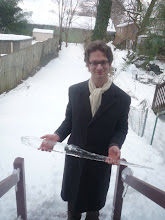This is just my own little attempt at translating the first few stanzas of the Divine Comedy. For terza rima, the noblest Italian poetic form, I've substituted blankverse iambic pentameter, the noblest English poetic form. Enjoy!
THE ITALIAN ORIGINAL
Nel mezzo del cammin di nostra vita
mi ritrovai per una selva oscura
ché la diritta via era smarrita.
Ahi quanto a dir qual era è cosa dura
esta selva selvaggia e aspra e forte
che nel pensier rinova la paura!
Tant’è amara che poco è più morte;
ma per trattar del ben ch’i’ vi trovai,
dirò de l’altre cose ch’i’ v’ho scorte.
Io non so ben ridir com’i’ v’intrai,
tant’era pien di sonno a quel punto
che la verace via abbandonai.
Ma poi ch'i' fui al piè d'un colle giunto,
là dove terminava quella valle
che m'avea di paura il cor compunto,
guardai in alto, e vidi le sue spalle
vestite già de' raggi del planeta
che mena dritto altrui per ogne calle.
________________
MY TRANSLATION
Halfway upon the pathway of our life
I found myself within a dusky wood
Where the straight road had been utterly lost.
Oh, how difficult for me to say
What this wood was, wild, furious, raw,
Whose very memory renews my fear!
It was so bitter death scarce more could be;
But as some good too came of this, therefore
Shall I speak of what I found therein.
I have no memory of my entry there there,
So weary, dreary, was I at the moment
That I abandoned the straightforward way.
But after I reached the mountain’s root
Where the dreadful valley had its end
Which with fear had pierced my heart full through
I looked up, and upon its shoulders saw
Them vested with the cloak of the planet’s rays
Which guide the others right on every road.
Later, hopefully to-morrow, I'll do a post about 'Why Paradise Lost Is So Beautiful'. Hint: it's because John Milton is the baddest sunuvabitch in post-Renaissance literature. Dude's rhymes were so dope, as somebody who is decidedly not me might say.




